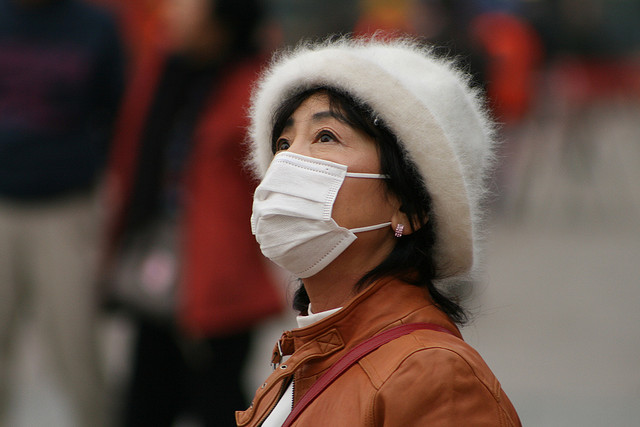SHARES

“I always look forward to holidays so that I can go back to my small hometown in the country side. This big city is making me anxious, tired and moody. Maybe the air pollution is making me go out of breath.”
In fact, studies show that exposure to air pollutants, whether for an extended period of time or temporarily, can result in negative impact on our mental health.
Air Pollutants and Health Hazard
Generally, air pollution describes a mixture of particles in the air, that is dangerous to health. These particles comprise gas molecules (NO2, SO2, O3, CO, etc), heavy metals, and particulate matter (PM).
As a matter of fact, human activities such as open burning, factory emission, car exhaust emission as well as large-scale agriculture, livestock farming, all can produce air pollutants. Besides, nature can also cause significant air pollution too, as in the event of wildfires and windblown dust storms.
Scientists have long studied the impact of air pollution on our body’s physical health. These pollutants are evidently bad for the lungs and heart.
However, researchers are starting to notice a link between mental health problems and exposure to air pollutants. Yet, it is still too early to conclude on any cause-and-effect relationship between them. It is still not entirely clear how they are related, directly or indirectly.
Air Pollution and Mental Health Problems
Exposure During Growing Up Years
Several studies show that growing up in neighbourhoods with higher air pollution relates to higher rates for mental health problems including bipolar mood disorders (29%), depression (51%), and schizophrenia (148%)!
Besides, younger children are showing weak association with autistic spectrum disorders as well as poor cognitive development. Whilst with older adults, some can present with cognitive decline and dementia.
These mental health impacts become greater in the presence of other confounding factors such as lower socio-economic status and education. Having said so, air pollution alone still associates with mental health problems despite being adjusted for differences in age, gender, socio-economic status and education. On a cautionary note, some studies estimate exposure to air pollution by measuring their home distance from major traffic spots. This may not be an accurate measure for air pollutant exposure. It also leaves room for other possible causes such as sleep disturbances and noise pollution.
Temporary Exposure
Apart from constant or pollution exposure from childhood, temporary exposure to air pollutants also correlates with more episodes of depression, anxiety and suicide. This commonly happens to people with existing physical and/or mental health problems. For instance, Yackerson et al. noticed worsening of psychotic symptoms and increasing suicide attempts in relation to the Eastern winds in Israel which contain high concentration of air pollutants. Likewise, in the warmer seasons of Canada, short term increase in air pollutants also happens together with more emergency room visit for depression and anxiety symptoms.
How Do Air Pollutants Affect Mental Health?
The underlying working behind it is still not entire clear. One theory could be inhalation of air pollutants especially particulate matter (PM) which can cause inflammation to both our body and brain. In this sense, it puts the entire body under stress. This in turn disrupts the brain’s control over our body stress response. Furthermore, generalised inflammation can stimulate our body’s nerve endings and changes how our brain tissues function. Ultimately, the brain microglial cells produce more harmful chemicals (cytokines and oxidants) in the brain. As a result, we start to experience psychotic symptoms and mood changes due to altered brain chemistry.
Also, tiny air pollutants may reach the brain directly by crossing the blood-brain barrier or through the nerve endings in our nose. Accumulation of these harmful air pollutants can cause damage to our brain tissues. On top of that, our immune cells may sometimes make the situation worse. For example, the macrophages can engulf the tiny air pollutant in our body and accidentally help them move across the blood-brain barrier. It may even trigger the production of antibodies that attack our own brain cells containing these air pollutants.
Conclusion
Studies around the globe are showing a possible link between air pollution and mental health illness. But, it is still inconclusive whether such exposure is causing the mental health problem observed. Also, how air pollutants can cause symptoms of mental health issues is still not entirely clear. Even so, protective factors against poor mental health such as exercising, good stress management and sleep hygiene still play important roles.
Find a Psychologist and Psychiatrist in Malaysia, on GetDoc
Find a Psychologist and Psychiatrist in Singapore, on GetDoc
References:
1. Khan A, Plana-Ripoll O, Antonsen S, Brandt J, Geels C, Landecker H, et al. Environmental pollution is associated with increased risk of psychiatric disorders in the US and Denmark. PLOS Biology. 2019 Aug 20;17(10): e3000513. https://doi.org/10.1371/journal.pbio.3000353
2. Lake J. The impact of air pollution on mental health [Internet]. Psychology Today. Sussex Publishers, LLC. 2020. (Available from: https://www.psychologytoday.com/us/blog/integrative-mental-health-care/202001/the-impact-air-pollution-mental-health; last updated on 2020 Jan 8; last accessed on 2020 May 20)
by Chang Xian
View all articles by Chang Xian.







